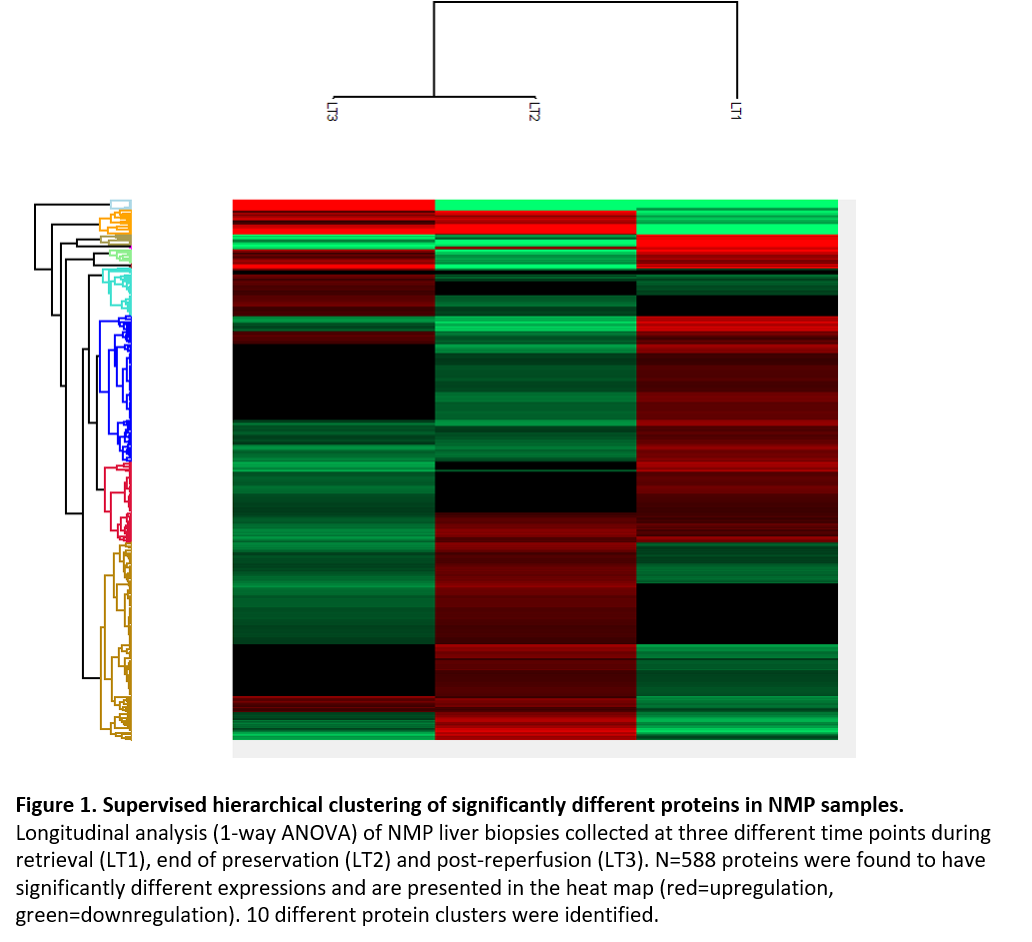Normothermic Machine Perfusion of the Liver Supports Protein Translation and Mitochondrial Function While Reducing Protein Degradation and Metabolic Imbalance: A Proteomics Study
L. Lo Faro1, A. Thorne2, H. Huang3, P. Charles3, M. Kaisar1, S. Davis3, F. Dengu1, S. Shaheed1, J. Mulvey1, R. Fischer3, D. Nasralla4, B. Kessler3, H. Leuvenink2, P. Friend1, R. Ploeg1
1Nuffield Department of Surgical Sciences, University of Oxford, Oxford, United Kingdom, 2University Medical Center Groningen, Groningen, Netherlands, 3Nuffield Department of Medicine, University of Oxford, Oxford, United Kingdom, 4Royal Free London NHS Foundation Trust, London, United Kingdom
Meeting: 2022 American Transplant Congress
Abstract number: 389
Keywords: Inflammation, Ischemia, Liver metabolism, Machine preservation
Topic: Basic Science » Basic Science » 15 - Machine Perfusion and Organ Rehabililtation - Basic
Session Information
Session Time: 8:25am-9:30am
 Presentation Time: 9:00am-9:15am
Presentation Time: 9:00am-9:15am
Location: Hynes Veterans Auditorium
*Purpose: Liver preservation by normothermic machine perfusion (NMP) involves perfusion of the graft with oxygenated blood and nutrients. The NMP Liver trial by the Consortium for Organ Preservation in Europe (COPE), has shown that NMP is associated with a reduction in graft injury and increased organ utilisation when compared to static cold storage (SCS). The aim of the present study is to provide insight into the molecular mechanisms involved in NMP liver preservation by proteomics analysis.
*Methods: Biopsies from DBD and DCD livers preserved using SCS or NMP were collected as part of the COPE Liver trial at time of retrieval (LT1), at the end of preservation (LT2) and 1 hour after reperfusion in the recipient (LT3). A total of n=437 samples were analysed for this study. Proteins were extracted, digested and analysed by quantitative label-free proteomics (LFQ LC-MS/MS). Protein expression was analysed over time by 1-way ANOVA with permutation-based FDR (1%).
*Results: Longitudinal analysis of NMP samples (LT1 vs LT2 vs LT3) identified n=588 proteins with significantly different expressions (p< 0.05, FDR 1%, Figure 1). Biopsies at the end of NMP presented upregulated protein translation and increased mitochondrial function and ATP synthesis, alongside downregulation in glycolysis and fatty acid and protein degradation. Similar analysis on SCS samples showed no changes in protein expression between retrieval and end of preservation biopsies, with, in contrast to NMP, a significant downregulation in mRNA processing, mitochondrial electron transport and ATP production post-reperfusion.
*Conclusions: The proteomics analysis highlights significant protein changes over the donation-preservation and reperfusion process, with NMP supporting protein translation and mitochondrial function while reducing protein degradation and metabolic imbalance, as opposed to SCS. These findings represent the first large set of proteomics data from the COPE NMP Liver trial and might help to further our understanding of the molecular mechanisms involved in NMP.
To cite this abstract in AMA style:
Faro LLo, Thorne A, Huang H, Charles P, Kaisar M, Davis S, Dengu F, Shaheed S, Mulvey J, Fischer R, Nasralla D, Kessler B, Leuvenink H, Friend P, Ploeg R. Normothermic Machine Perfusion of the Liver Supports Protein Translation and Mitochondrial Function While Reducing Protein Degradation and Metabolic Imbalance: A Proteomics Study [abstract]. Am J Transplant. 2022; 22 (suppl 3). https://atcmeetingabstracts.com/abstract/normothermic-machine-perfusion-of-the-liver-supports-protein-translation-and-mitochondrial-function-while-reducing-protein-degradation-and-metabolic-imbalance-a-proteomics-study/. Accessed July 14, 2025.« Back to 2022 American Transplant Congress

